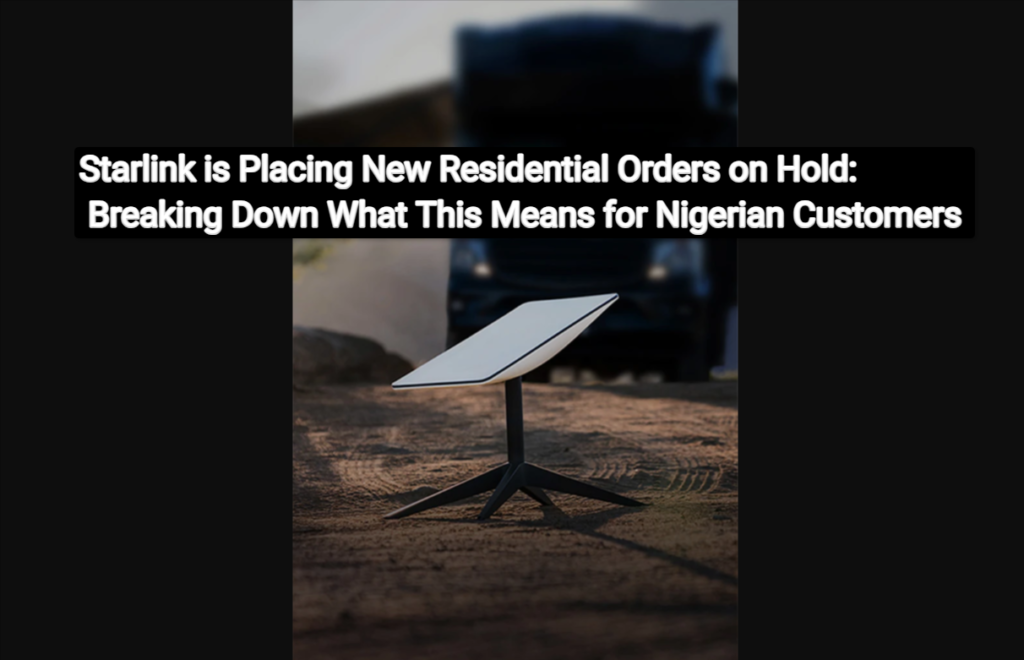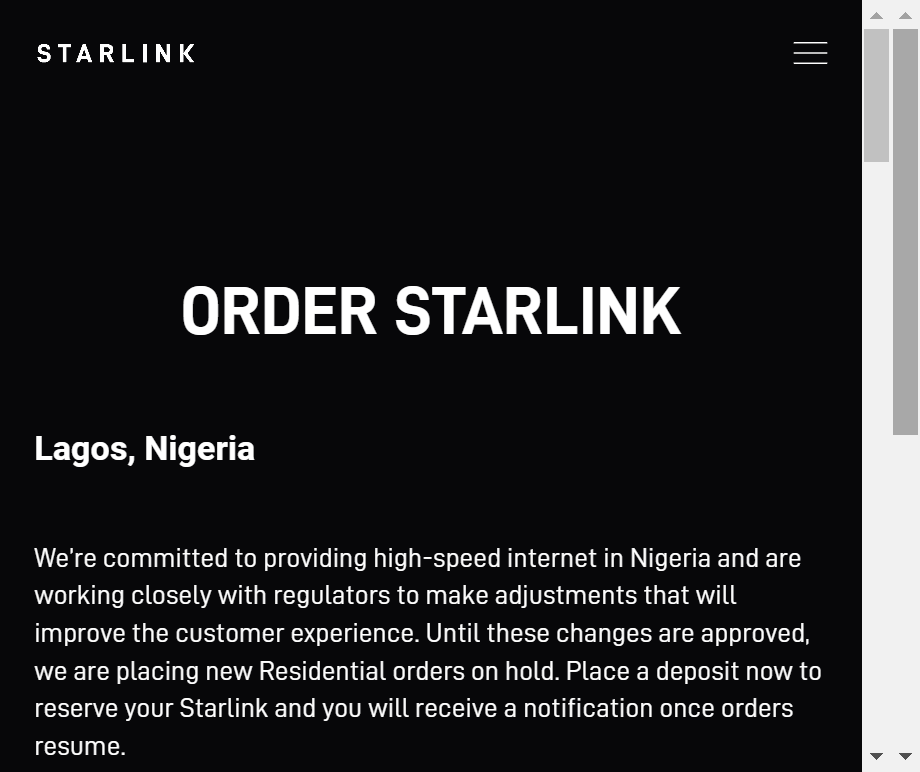Starlink is Placing New Residential Orders on Hold: Breaking Down What This Means for Nigerian Customers

Starlink is Placing New Residential Orders on Hold: Breaking Down What This Means for Nigerian Customers
The news that Starlink has temporarily paused new residential orders in Nigeria has sparked a lot of interest and questions. If you’re one of the many people eagerly waiting to bring high-speed satellite internet into your home, you’re probably wondering what comes next. This article will explain the situation clearly, without the jargon, and provide a deeper look at how Starlink works, what this hold on orders means, and what you can do in the meantime.
What Exactly is Starlink?
Let’s start by making sure we’re all on the same page. Starlink is an internet service provider (ISP) launched by SpaceX, offering satellite-based internet that aims to deliver reliable, high-speed internet to the most remote corners of the planet. This is a game-changer for regions where traditional internet service is either unreliable, slow, or simply unavailable.
With Starlink, users can experience internet speeds comparable to fiber and cable internet providers, but the key difference is that Starlink operates through a network of satellites orbiting the Earth. This means it can bring fast internet to places that have always been beyond the reach of wired connections.
Why are New Residential Orders on Hold in Nigeria?
Now, let’s address the elephant in the room. Why has Starlink put new residential orders on hold in Nigeria? The official reason is that Starlink is in the process of working with regulators to make adjustments that will improve the customer experience. This could mean several things, but it’s likely Starlink is ironing out the details of its service to ensure it meets local laws and operates smoothly in the country.
It’s important to note that this isn’t a permanent halt. The company is still accepting deposits and promises to notify customers once orders can resume. This is reassuring because it shows that Starlink is serious about delivering its service to Nigeria, even if there are some regulatory hoops to jump through first.

How Does the Ordering Process Work?
Before we dive deeper into what this pause means for you as a prospective customer, let’s quickly go over how Starlink’s ordering process looks in Nigeria.
- Deposit Payment: To get in line for the service, you’ll need to pay a deposit of ₦32,000. This is essentially your reservation fee and will secure your place in the queue.
- Service and Hardware Costs: Once the service becomes available again, you’ll need to pay ₦590,000 for the hardware (which includes the Starlink dish, router, and associated cables) and ₦38,000 per month for the service itself.
- Shipping: There’s also a shipping and handling fee of ₦16,700 to deliver the equipment to your location.
When you place your deposit, Starlink will keep you in the loop and notify you once the orders resume. Although the waiting game can be frustrating, this deposit system ensures that you won’t miss out on getting connected as soon as the regulatory adjustments are completed.
What Can You Do While You Wait?
With orders on hold, you might feel stuck in limbo, but there are a few things you can do to stay ready for when Starlink becomes available again.
1. Download the Starlink App
Starlink offers a handy app for both Android and iOS that helps you find the best installation spot for your dish. This is crucial because the dish needs an unobstructed view of the sky to connect to the Starlink satellites. The app is simple to use and allows you to survey your location in advance, so once your hardware arrives, you’ll know exactly where to set it up.
2. Check Alternative Business Options
While residential orders are paused, Starlink is still offering select business plans. If you’re running a business, especially in a remote area, this could be a great opportunity to bring in reliable, high-speed internet right away. Business plans come with different pricing and hardware packages, but they offer the same promise of fast, dependable internet.
3. Stay Informed
This might seem obvious, but staying in the loop is crucial. Starlink has a Help Center and Community Gateway where they regularly post updates and answer common questions. Make sure to check these resources or sign up for email notifications to stay updated with the latest news.
The Bigger Picture: Why Starlink Matters for Nigeria
Nigeria is one of the most populous countries in Africa, but internet access remains a challenge in many regions. For individuals and businesses outside of major cities, internet service is often slow, expensive, or non-existent. This is where Starlink comes into the picture as a potential game-changer.
1. Bridging the Digital Divide
Starlink’s satellite-based system is particularly well-suited for rural and remote areas, where laying fiber-optic cables and other infrastructure is often too expensive or logistically impossible. By beaming internet directly from space, Starlink can provide fast, reliable internet to places that previously had no access at all.
This could have an enormous impact on education, healthcare, and economic opportunities in under-served regions. Students in rural areas could take part in online learning for the first time, farmers could access real-time market data, and telemedicine could become a reality for remote communities.
2. Improving Business Connectivity
For businesses, especially those operating in Nigeria’s more remote areas, reliable internet can be a game-changer. Whether it’s for managing supply chains, communicating with customers, or conducting research, having access to fast internet is essential in today’s world. Starlink’s business plans are designed to meet these needs, offering a more robust service for companies that need reliable, high-speed connections.
How Does Starlink Compare to Other ISPs?
If you’re considering Starlink, you’re probably wondering how it stacks up against other internet service providers in Nigeria. While traditional ISPs like MTN and 9mobile rely on mobile networks and fiber-optic cables, Starlink’s satellite-based system offers some distinct advantages and a few trade-offs.
1. Speed and Reliability
One of the biggest selling points of Starlink is its speed. While traditional ISPs in Nigeria often struggle to provide consistent speeds, especially in rural areas, Starlink is designed to offer speeds of up to 150 Mbps or more. This makes it ideal for activities like streaming, video calls, gaming, and working from home.
However, it’s worth noting that satellite internet can be affected by weather conditions. Heavy rain or thick clouds can sometimes interfere with the signal, which is something to consider if you live in an area prone to tropical storms.
2. Coverage
When it comes to coverage, Starlink has a clear advantage. Traditional ISPs need to build infrastructure in each area they serve, which can be expensive and time-consuming. Starlink, on the other hand, can provide service almost anywhere, as long as there’s a clear view of the sky. This makes it ideal for rural areas, but also for people who travel frequently or live in areas where traditional ISPs don’t reach.
3. Cost
Let’s be honest: Starlink isn’t cheap. At ₦38,000 per month, it’s more expensive than many traditional internet plans in Nigeria. However, the cost is justified by the reliable, high-speed service it provides, especially in areas where no other options exist. For people living in remote areas, Starlink might be the only viable option for getting online, and for many, that’s worth the price.
Setting Up Starlink: What to Expect
One of Starlink’s biggest selling points is how easy it is to set up. Even if you’re not tech-savvy, you should have no trouble getting your Starlink dish up and running. In fact, the setup process is so simple that it can be boiled down to two steps:
- Plug it in.
- Point at the sky.
The dish comes pre-configured, so once it’s plugged in, all you need to do is find a clear view of the sky. The app will help you determine the best spot for installation, and within minutes, you should be online.
What’s Next for Starlink in Nigeria?
While the current hold on new residential orders might be frustrating, it’s clear that Starlink is committed to bringing its service to Nigeria. The company is working with regulators to ensure that everything is in place for a smooth rollout, and once that’s done, we can expect orders to resume.
In the meantime, if you’re interested in Starlink, placing a deposit is a smart move to secure your spot in line. And if you’re running a business, it’s worth exploring the available business plans to see if they meet your needs.
My Final thought
Starlink has the potential to revolutionize internet access in Nigeria, especially for those in rural or remote areas. While the temporary hold on residential orders might be frustrating, it’s a sign that the company is working hard to ensure a smooth and successful launch.
In the meantime, keep an eye on updates from Starlink and explore alternative options like business plans. With a little patience, you’ll soon be able to experience the benefits of high-speed satellite internet in Nigeria.
